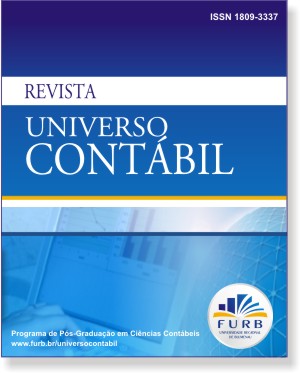DISCLOSURE OF VOLUNTARY ACCOUNTING INFORMATION BY A PUBLIC COMPANY OF THE BRAZILIAN SOUTH REGION
DOI:
https://doi.org/10.4270/ruc.20084Keywords:
Evidenciação contábil, Informações voluntárias, Governança corporativa.Abstract
The promulgation of Law n. 11.638/07 has made it necessary to open companies to publish DFC (an acronym for Cash Flow Statement) and DVA (an acronym for Added Value Statement). However, until then some companies opted not to divulge this information, making them representative of a spread to the market analysts. Thus, the present paper aimed at investigating which of the voluntary accounting information disclosed by 107 companies came from the South of Brazil in 2006. Methodologically, this is a documentary study of a descriptive nature, effected through content analysis. The research reveals that the EBITDA was the most common spontaneous report, followed by the disclosure of intangibles and the DFC. The Balance Sheet and the DVA were more rare. The finding of specific analysis in each of the states suggested a higher interest in social issues by the companies from Paraná and Santa Catarina states. It was noted that the voluntary disclosures in the South of the country are small; more than 35% of the companies did not make any kind of investigative disclosures. The companies from the industrial goods sector were responsible for most of the spontaneous disclosures and there was a high rate of participation from the cyclic consumption sector in the disclosure of Balance Sheets and intangibles. As of the relationship between the analyzed disclosures, the DFC and DVA reports can be explained by the EBITDA presentation. Finally, the results suggest that the investigated companies still have to make a lot of progress with respect to the disclosure of accounting information.
Downloads
Downloads
How to Cite
Issue
Section
License
The copyright for papers published in this journal belong to the author, with rights of first publication for the journal. As the papers appears in this publicly accessed journal, the papers are for free use, receiving their credit, in educational and non-commercial uses. The journal will allow the use of the papers published for non-commercial purposes, including the right to send the paper to publicly accessed databases.


